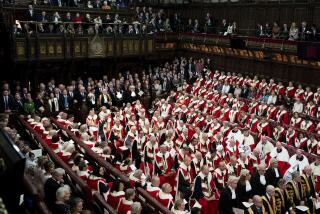Fully Elected House of Lords Ruled Out
- Share via
LONDON — The House of Lords, the traditional domain of Britain’s aristocracy, should have some popularly elected members and must represent all sectors of an increasingly diverse society, a government-appointed commission said Thursday.
But the panel ruled out a fully elected upper chamber of Parliament on the order of the U.S. Senate, saying that the House of Lords shouldn’t challenge the authority of the more powerful House of Commons. Instead, the vast majority of members would be selected by an independent commission.
Critics quickly denounced the recommendations as “cosmetic changes” and said the commission had missed a historic opportunity to create a democratic house.
“It is a sellout to the old establishment,” said Robert Maclennan, a spokesman for Britain’s third party, the Liberal Democrats. “In a democracy, the only true representative is elected.”
The Labor Party government of Prime Minister Tony Blair abolished the centuries-old right of hereditary peers to sit in the House of Lords last year.
All but 92 of the hereditary peers--lords and ladies, barons and baronesses who inherited their titles--were ousted in what was called the first stage of a House of Lords reform. Hundreds of so-called life peers who are named by the government but cannot pass on their seats remained in the house.
Lord Wakeham, a Conservative former Cabinet minister who headed the commission, said his plan offers “radical change” because it would eliminate the right of peers to sit in the upper chamber and would end a system of political patronage in which the prime minister names life peers.
Under the commission’s blueprint, there would be about 550 members in the upper house appointed for terms of 15 years, of which no more than 195 would be elected from the different regions of Britain. The commission was unable to agree on a precise number and means of election.
The rest of the members would be appointed by an independent commission, which would have to take some quotas and national election results into account. At least 30% of the members would be women--a dramatic increase from the current makeup--and 20% would have to be what are called cross-benchers, people who do not represent a political party.
Any reforms would have to be adopted by the government and passed into law.
More to Read
Sign up for Essential California
The most important California stories and recommendations in your inbox every morning.
You may occasionally receive promotional content from the Los Angeles Times.












